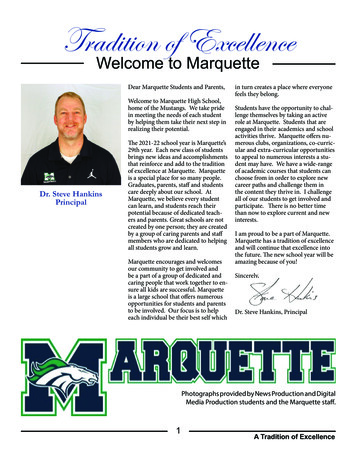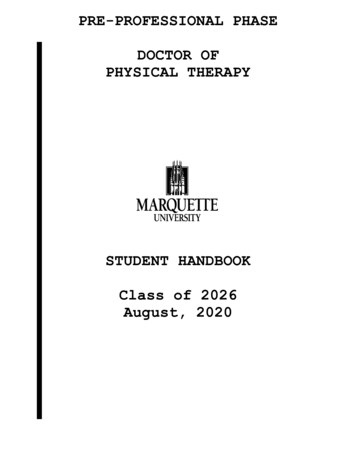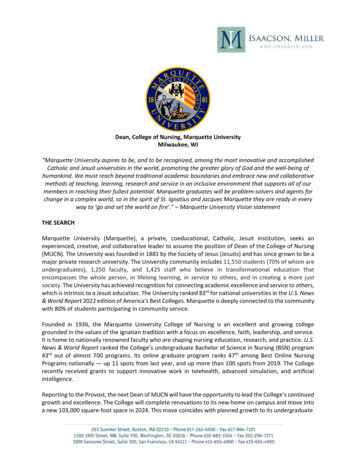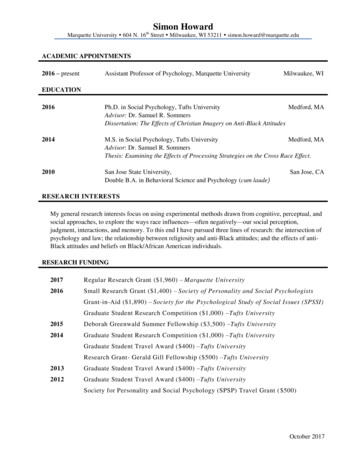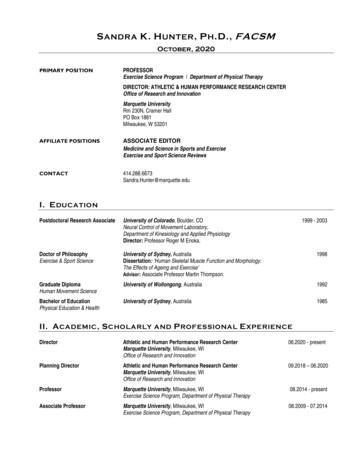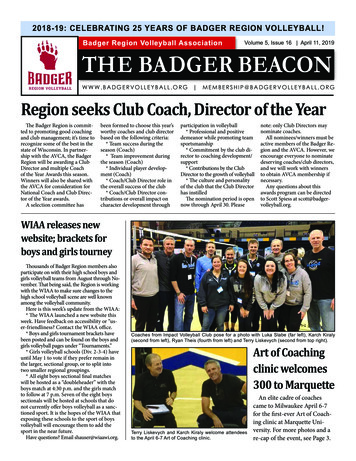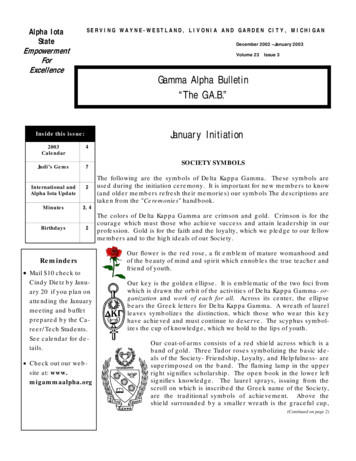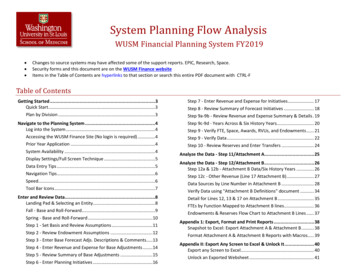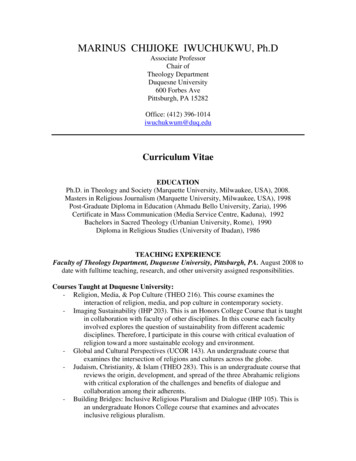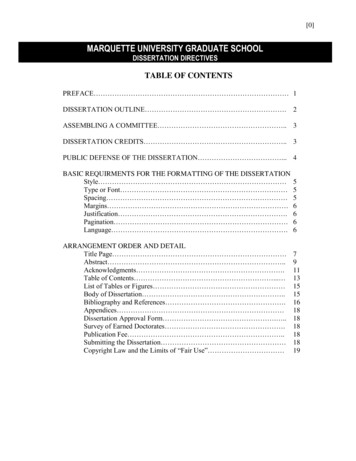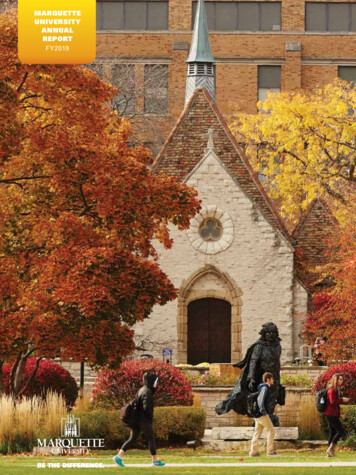
Transcription
MARQUETTEUNIVERSITYANNUALREPORTFY2019
This page has been intentionally left blankMARQUETTEUNIVERSITYANNUALREPORTFY2019BE THE DIFFERENCE.It’s not just a tagline — it’s what Marquette Universityasks of its community. It’s what our students,faculty and staff aspire to do every day.We also ask them to be bold. Be visionary.Be fearless. Be themselves.These are demanding requests, but we’ve given thema map. Grounded in our Catholic, Jesuit mission, visionand values, and guided by our visionary strategic plan,Beyond Boundaries, the entire university communityhas been called on to think differently and act differentlyso that we may truly Be The Difference.To do this successfully requires responsiblefiscal stewardship through a culture of investmentand innovative revenue growth.This financial report provides not only a snapshotin time of Marquette’s financial health, but alsoa glimpse forward — how the university invests initself today is the foundation for how it willBe The Difference in the future.
CONTENTSUNIVERSITYFACTSCOLLEGES ANDSCHOOLSHelen Way Klingler Collegeof Arts and SciencesCollege of BusinessAdministrationJ. William and Mary DiederichCollege of CommunicationCollege of EducationOpus College of EngineeringCollege of Health SciencesCollege of NursingSchool of DentistryGraduate SchoolMarquette University is a Catholic, Jesuit universityGraduate School ofManagementlocated near the heart of downtown Milwaukee,Law SchoolWisconsin, that offers a comprehensive range of03 UNIVERSITY FACTSmajors in 11 nationally and internationally recognized04 FROM MARQUETTE’S LEADERSHIPcolleges and schools.08 MISSIONA Marquette education offers students a virtually14 STUDENTSunlimited number of paths and destinations, and20 ACADEMICSprepares them for the world by asking them to think26 RESEARCH AND INNOVATIONcritically about it.32 ATHLETICS38 OUR PEOPLE44 PARTNERSHIPS50 FINANCES, OPERATIONS ANDADMINISTRATION56 PHILANTHROPY62 FINANCIALS11,605 total enrollment8,435 undergraduate3,170 graduate and professionalAlong the way, we ask one thing of every student:Be The Difference.STUDENTSACADEMICSUndergraduate programs:80 majors and 78 minors andpre-professional programs indentistry, law and medicinePostgraduate programs:66 doctoral and master’sdegree programs, 18 graduatecertificate programs, andprofessional degrees indentistry and lawFA C U LT Y A N D S TA F F1,246 faculty andacademic positions1,680 exempt andnon-exempt staff90 UNIVERSITY OFFICIALSAT H L E T I C S16 NCAA Division Iathletics teamsCompetes in theBIG EAST Conference2M A R Q U E T T E U N I V E R S I T Y A N N U A L R E P O R T F Y 2 0193
FROMLEADERSHIPThis page has been intentionally left blankA MESSAGE FROMDr. Michael R. Lovell,PresidentFew responsibilities can be as invigorating — and at the times asoverwhelming — as staying true to a tradition that dates back hundredsand hundreds of years. Marquette University has existed for 138 yearsand our greater organization can trace a history back more than 450years, when Ignatius of Loyola and his colleagues founded the first ofseveral Jesuit institutions in Sicily. This is the challenge that Catholic,Jesuit universities accept when they carry on their mission of producingmen and women who live their lives in service to others.Specifically at Marquette, we are embracing the imperative to serveothers by going beyond classroom education and sharing with studentsthe knowledge and tools they need to improve the communities in whichthey live. As a result, we are constantly looking for new and innovativeways to help address some of Milwaukee’s most pressing challenges anduniquely connect our talents and resources to benefit our community.You’ll see great progress in this annual report. We’re expanding E-Lead,unlearning racism and rallying around the first-ever winner of thePresident’s Challenge award. We’re also looking to a future of onlineacademic programs and better engaging with our corporate community.All this progress we make because of our outstanding Marquettecommunity. Faculty, staff and students — it’s also our alumni, communitypartners and corporate friends. And as our mission states: “All this wepursue for the greater glory of God and the common benefit of thehuman community.”4Dr. Michael R. LovellPresidentMarquette UniversityMarquette will alwaysbe committed to anemphasis on the liberalarts and humanities inits teaching, a focuson cura personalisand magis, a missionof service to and withothers, and a desire totransform the broadercommunity — not justthe acres within ourcampus boundaries.M A R Q U E T T E U N I V E R S I T Y A N N U A L R E P O R T F Y 2 0195
FROMLEADERSHIPThis page has been intentionally left blankA MESSAGE FROMJoel Pogodzinski,Senior Vice President andChief Operating OfficerJoel PogodzinskiSenior Vice President andChief Operating OfficerThere is muchthe Marquettecommunity shouldbe proud of andexcited about. Thismomentum marksone of the mostpivotal times forthe university.To be successful, a modern university must be nimble. We need toadapt to new ways of teaching and delivering transformative learningexperiences as our landscape — and the needs of our students — shift.We must be equally agile to ensure that the institution has a clear visionand strategy and is properly resourced to deliver on its promise.In the Jesuit tradition, these focuses are known as cura personalis(“care for the person”) and cura apostolica (“care for the enterprise”).Though they may at times seem in opposition to one another, these arenot competing forces — rather, joined together they make a Jesuituniversity like Marquette distinct.In this, our FY2019 Annual Report, you will see clear examples of howMarquette carefully balances our centuries’ old mission and traditionwith the realities of providing a higher education to an increasinglydiverse student body amid an ever-shifting and challenging marketplace.You will read about alumnus Barry Cosgrove, who grew up “poorer thanpoor,” only to give back to his alma mater with a generous gift to fundscholarships for first-generation students. You will be inspired by MalainaMoore, a remarkable student whose own experiences dealing withracial bigotry motivated her award-winning play, White Privilege. Andyou’ll learn about how Marquette’s commitments to communityengagement and corporate engagement go hand-in-glove.Indeed, whether building a culture of philanthropy or fostering newpartnerships on and off campus, we at Marquette University take greatcare to be responsive and innovative in our approach, while maintainingand promoting our Catholic, Jesuit identity.It is our great privilege to do all of this so that our entire universitycommunity — students, faculty, staff and alumni — can trulyBe The Difference.6M A R Q U E T T E U N I V E R S I T Y A N N U A L R E P O R T F Y 2 0197
MISSIONCATHOLIC CONNECTIONSMilwaukee’s first archbishop, John Martin Henni,helped establish Marquette as a Catholic, Jesuituniversity in 1881. Paying homage to the intertwinedhistory of the city, Marquette and its Catholiccommunity, Marquette President Michael R. Lovellgave the opening remarks at the archdiocese’s 175thanniversary event in May 2019. President Lovellspoke of Archbishop Henni’s influence on the city,FORTHEGREATERGLORYOF GODSt. Ignatius of Loyola,founder of the Society of JesusJesuit causes and the Marquette mission, as well asJESUIT SCHOOLS:27 STRONGCatholicism’s important role in transformingSince 1548, Jesuit highereducation has remainedcommitted to academicexcellence, service, leadershipand caring for the whole person.Marquette is one of 27 schoolsthat compose the Associationof Jesuit Colleges andUniversities. Memberinstitutions are committedto self-evaluation and peerreview to affirm the missionof Catholic, Jesuit education,and collaborate on initiativesto support best practices,advocate at the national level,and advance internationaleducation and global citizenship.Milwaukee, past, present and future.Nearly 140 years later, Marquette remains an integralpart of the city’s Catholic community. In a sharedmission with Milwaukee’s archdiocese, we are calledto provide transformative higher education to ourstudents, and to serve the city and its residents forgenerations to come.Milwaukee Archbishop JeromeListecki and Marquette PresidentMichael R. Lovell at the archdiocese’s175th anniversary celebration.8M A R Q U E T T E U N I V E R S I T Y A N N U A L R E P O R T F Y 2 0199
MISSION“Small experiment” in peacemakingbecomes a national modelSally and Dr. Terrence Rynneat the 2019 James W. FoleyFreedom Awards ceremony.H U M A N I TA R I A NOF THE YEARIn April 2019,the James W. Foley Foundationhonored Dr. Terrence Rynne withthe 2019 Humanitarian of the Yearaward for his work in conflictresolution and peacemaking. Inaddition to making the initial gift toestablish Marquette’s Center forPeacemaking, Rynne and his wife,Sally, have together founded anamesake foundation dedicated topeace and the empowermentof women. Rynne also helped penthe New Year’s Day 2019 peacemessage delivered by Pope Francis.The Center forPeacemaking atMarquette Universitystarted in 2008 as“a small experimentwith a 1.5-person staff,”says Director PatrickKennelly. Today, it’s oneof the largest researchcenters on campus,with about one in fiveundergraduate studentsparticipating in itsinitiatives each year.Founded by Marquette theologyinstructor Dr. Terrence Rynne andinformed by the Jesuit missionof reconciliation and working forpeace, the center explores thepower of nonviolence by fosteringresearch and action to promotesocial justice, human dignity andpeace in partnership with thebroader community.Kennelly points out that Marquetteis the only Catholic school in thecountry with a major and a minor inpeace studies, as well as an academiccenter focused on nonviolence.“It’s one of the fastest-growinginterdisciplinary majors and minors,”he says. “The center uses student10knowledge and research to addresssocial realities in communities allof our projects involve nonviolence,research from students and servingthe vulnerable.”In addition to bringing the Peaceworksprogram to more than 500 Milwaukeepublic and Catholic school studentsand studying nonviolence in othercountries, the center is part ofNear West Side Partners, anonprofit comprising nearby privatecorporations. The organizationswork together to revitalize theneighborhoods in which they arelocated as safe, thriving business andresidential areas. One NWSP project,“Promoting Assets, Reducing Crime,”launched in 2015; crime has sincebeen reduced by 25 percent and26 new businesses have opened,offering 100 new full-time jobs.A yearlong campaign celebratingthe center’s 10th anniversary andpromoting its impact concludedin May 2019 and yielded somesignificant wins. In conjunctionwith the NWSP, the center secureda 1.3 million government grant totransform public housing in the areaaround Marquette. The campaignalso helped grow the center’sendowment to nearly 2 million thisfiscal year.The Center for Peacemaking offers week-longand semester-long travel programs for studentsto learn about and contribute to internationalpeacemaking projects. Students on the center’sstudy abroad program in northeast Indiaparticipate in a Jesuit peacemaking project thateducates tea workers on their legal rights.M A R Q U E T T E U N I V E R S I T Y A N N U A L R E P O R T F Y 2 01911
MISSIONOf humble beginnings, alumnus pays it forward“Poor kid” Barry Cosgrove endows scholarship for first-generation students“Those who mostoften get caughtin the struggle ofhigher educationcosts are the samestudents who mostneed a fair chanceat the advantagesof a Marquetteeducation.”A self-described “poorer than poor”kid from suburban Boston, BarryCosgrove, Jour ’79, has achievedthe kind of career success that in2019 earned him an All-UniversityAlumni Award for ProfessionalAchievement. Though he workedhard and was savvy about seizingopportunities, Cosgrove creditsmuch of his upward trajectory to“the generosity of others.”The Marion Krug Cosgrove EndowedScholarship is named in memory ofCosgrove’s mother, the mostinfluential person in his life “becauseof her decency, hard work, resilience,reliability and loyalty,” he says.Cosgrove, a founder of DaVita dialysiscenters and current president, CEOand chairman of Blackmore Partners,says the EOP program — which, at 50years strong, was one of the nation’sThe help he received — including from first — helped him develop bothleadership skills and empathy. WhileMarquette’s Educational Opportunityvisiting campus to accept his alumniProgram, which provides mentoringaward, he recently drew additionaland support for low-income, firstinspiration from a banner adorning ageneration and minority students —campus building; it reads: “The Guts toinspired Cosgrove’s 2019 gift ofTry, the Heart to Care and the Resolve 1 million, which he and his wife,to Be The Difference.” He remainsIngrid, directed toward scholarshipconnected to Marquette as a foundingsupport for first-generation studentsmember of the university’s newin the College of BusinessPresident’s Advisory Council.Administration, as well as thosemajoring in journalism.New sacred space honors the Blessed MotherA May 1, 2019, dedication ceremony brought together students, faculty,staff, community members and Milwaukee Archbishop Jerome Listeckito honor, welcome and bless Marquette’s new statue of the Virgin Mary.Visitors can find her sheltered in a new, free-standing grotto near the St.Joan of Arc Chapel that offers space for prayerful contemplation. Fundedby generous Marquette benefactors, the grotto was inspired by PresidentMichael R. Lovell’s capstone project in the Ignatian Colleagues Program,which cataloged sacred spaces on campus.Marquette benefactor Geraldine “Nana”Fotsch seeing for the first time the BlessedVirgin Mary statue in the university’s newMarian Grotto. Fotsch and her family donatedto the project.Barry Cosgrove, Jour ’7912M A R Q U E T T E U N I V E R S I T Y A N N U A L R E P O R T F Y 2 01913
STUDENTSBUILDING LEADERSIn January 2019, President Michael R. Lovell,Opus Dean of Engineering Kris Ropella and alumnusChuck Swoboda, Eng ’89, invited regional leaders inthe engineering industry to envision how Marquette’sburgeoning Innovation Alley might create the mostvalue for business and academia. The takeaway:develop the next generation of innovation leaders.THEPURSUITOFEXCELLENCEIN ALLTHINGSA defining part of Marquette’s missionThe Opus College of Engineering’s Engineers inthe Lead program, or E-Lead, was already nationallyrecognized and had garnered awards as a leadershipdevelopment program for 20 engineering studentseach year. Chuck, a trustee emeritus, along with hiswife, Karen, Eng ’90, gave a 1 million gift toimmediately double the capacity of the programand add 20 non-engineering majors to each incomingcohort. Says Chuck, “It is people who provide theS W O B O DA S M A K E ASLAM-DUNK GIFTThe Swobodas, especiallyChuck, are nearly unparalleled intheir zeal for Marquette men’sbasketball. As undergraduates,Karen and Chuck were both onthe pep squad and Chuck hada super-fan alter ego knownas the “Bleacher Creature.”Simultaneously with theirInnovation Alley gift, the coupledonated 1.5 million to supportthis iconic athletics program’scontinued growth.critical spark that drives innovative thinking.”A co-op student in the Opus College ofEngineering working at Milwaukee-basedHarley-Davidson Motor Company.14M A R Q U E T T E U N I V E R S I T Y A N N U A L R E P O R T F Y 2 01915
STUDENTSTheatre student pulls back curtain on racial tensionsWHITE PRIVILEGEI N T H E S P OT L I G H TMarquette’s production of WhitePrivilege was selected to beperformed in January 2019 at theKennedy Center American CollegeTheatre Festival, Region III, inMadison, Wisconsin. The festivalis a national theatre program thatprovides a catalyst to improve thequality of college theatre. MalainaMoore also received the CitizenArtist Award from the organization“for insisting that theatricalproduction is central to theurgent community, national andinternational conversations on thecampuses of higher education.”Inspired by socialmedia discussionsabout the meaningand impact of whiteprivilege, Marquettetheatre studentMalaina Moore decidedto tackle the topic ina few scenes writtenfor a class project.She ended up writing an entireplay, White Privilege, which openedMarquette’s 2018-19 theatreseason, selling out all three nightsand going on to win a prestigiousKennedy Center award.The play explores, through a seriesof vignettes, the discrepanciesin life experience between whitepeople and people of color. Thecharacters interact in ways thatilluminate advantages white peopleoften don’t realize they have andbiases about other racial groupsthey have left unexamined.“What made the play so importantis that I can go through it and givepeople themes now of wherethey can see white privilege It’s not just in politics or in thestreets, but also school, whereyou can get treated differently byteachers when you’re supposedto be treated equally,” Moore told16her assistant director in a We AreMarquette podcast.Moore says everyone from herclassmates to Chair of DigitalMedia and Performing Arts StephenHudson-Mairet encouraged herto develop the idea. HudsonMairet even recruited twowomen influential in Milwaukee’sprofessional theatre scene to helpMoore expand and polish the script.The faculty’s willingness to helpstudents find opportunities andmake connections is one of herfavorite aspects of Marquette’stheatre program. She also likes itsintensity. “They expect a lot fromyou because they are preparing youfor what you will deal with in thereal world,” Moore says, adding thather ultimate dream is to open herown theatre.As part of President Michael R.Lovell’s January 2019 presidentialaddress, Moore was honoredwith the Marquette DifferenceMaker Award for work thatmakes a positive impact on theMarquette community.The sold-out performances of herplay, Moore says, are an example.“It shows that even in venuesthat may cater more to whiteaudiences, the black experiencebrings in the same money and thesame attention, if not more.”Photo by A.J. Magoon (used with permission)Left to right: Cambryelle Getter, Rene Leech, Malaina Moore and Allie BrotzM A R Q U E T T E U N I V E R S I T Y A N N U A L R E P O R T F Y 2 01917
STUDENTSIt's cooler in The CommonsThe Commons by the numbersMarquette’s newest residence hall elevates student living“The Commonshas become anew ‘living room’for campus.We remaingrateful for theinvestment inthe residentialexperience forour students.”The Commons, Marquette’s firstnewly constructed student residencehall in 50 years, upgraded collegeliving for the 890 first- and secondyear students who moved in onAug. 23, 2018.with a mirrored wall; and multiplestudy lounges with fireplaces. 108 million construction costWindows are everywhere, providingsweeping city views as well assightlines between common areasto easily locate friends.One of the facility’s two residentialtowers bears the name of the lateRay and Kay Eckstein, recognizingtheir generosity to their almamater, including a 10 million giftto help construct The Commons.625 seating capacity in the diningfacility, which includes a barbecuesmokehouse, an allergen-free foodstation and wood-fired pizzasRooms lend themselves tocustomization: beds can be easilybunked, lofted or remain low; deskssnap apart and can be snapped intonotched platforms; closets canaccommodate dressers.Standout common areas include asmart classroom; a theatrestaircase with a floor-to-ceilingscreen for viewing sporting eventsor movies; the Practice Room, aperformance and rehearsal spaceThe facility also features manysustainability elements. The greenroof, underground stormwatercollection tank, low-flow water fixturesand energy-efficient LED lightingearned it LEED Silver certification.292,000 total square footage25 seats in the Saint Thérèse ofLisieux Chapel, part of a worshipspace that caters to all faith traditions3 fireplace lounges5 construction and design awardsThe Commons has wonDr. Xavier ColeVice President for Student AffairsA student group gathers on The Commons’“theatre stairs.”18M A R Q U E T T E U N I V E R S I T Y A N N U A L R E P O R T F Y 2 01919
ACADEMICSThis page has been intentionally left blankEXPANDING ACCESSMarquette announced in May 2019 that enrollmentwas open for its first fully online undergraduatedegree program, a bachelor of arts in strategiccommunication. The new course is part of auniversity-wide initiative to extend access to aMarquette education.“More than an enrollment strategy, expandingthe university’s offering of online degree programsremoves barriers and provides opportunities fornontraditional students, including older and/orworking people who seek to fit school into theirlives,” says David Schejbal, who joined Marquettein August 2018 as chief of digital learning.Marquette plans to add new online programs atthe graduate and undergraduate levels, expandoffline locations and increase online course optionsfor current students. In keeping with Marquette’sGOFORTHANDSET THEWORLDON FIRE.St. Ignatius of LoyolaONLINE OFFERINGSAt the end of the fiscal year,Marquette’s fully online offeringsin the Marquette Graduate Schooland the Graduate School ofManagement included master’sand/or Ph.D. programs in businessadministration, Christian doctrine,computing, corporatecommunication and healthcaredata analytics. An online masterof science in supply chainmanagement is also offered andincludes three four-day residentialworkshops on campus. Marquettealso offers an online certificateprogram in data science.mission, online programs integrate Ignatianpedagogy to create transformative learningexperiences that emphasize engagement andcritical reflection.20M A R Q U E T T E U N I V E R S I T Y A N N U A L R E P O R T F Y 2 01921
ACADEMICSMISSIONThis page has been intentionally left blankNew student media space boaststransformational technology, fosters integrationSTUDENTM E D I A L AU D E DIn March 2019, studentreporters from MUTV, MURadio and the Marquette Wireearned nearly 30 awards fromthe Wisconsin BroadcastersAssociation and the WisconsinNewspaper Association for theirwork covering news and eventson and off campus. Marquettestudents clinched first placein categories including WBAStudent Leadership Award,News Story Writing for Radio,Air Check for Radio, Podcasting,Public Affairs Programming andnews website for MarquetteWire, as well as top honors fromthe WNA in Collegiate Journalistof the Year, Infographic Designand Feature Photography.A game-changingmakeover of JohnstonHall’s second floor isreenergizing and unitingMarquette student media.With support from a 3.5 milliongift to the Diederich Collegeof Communication from theBernice Shanke GreiveldingerTrust, the transformed space nowaccommodates student audio,visual and print media teams inone shared area that features openspace, plenty of windows andcutting-edge technology.Before the renovation, even as audio,video and print reporting had beenintegrated in the all-digital MarquetteWire, student media teams remainedspatially divided. Radio offices and theMarquette Tribune newsroom werein the basement, while TV studios,control rooms and other offices wereon the second floor.“The renovation means we can bringeverything together on one floor,”says Mark Zoromski, director ofstudent media. “We are teaching ourstudents that to be successful, theyneed to know every side of media.Having them all together gives themthat experience.”The Greiveldinger gift catalyzed theproject and funded elements like animpressive newsroom with plenty of22natural light and attractive views thatcan accommodate dozens of studentsfrom across media disciplines at anygiven time, encouraging collaboration.There is also a new video-audiocontrol room with digital tools thatrival industry standards and facilitatelive programming, incorporationof musical performances andprerecorded bits, and more.Two new radio studios have upgradedequipment, which students have saiddemonstrates that Marquette valuesthe work they are doing and inspiresthem to work harder.Finally, students now have a greenscreen room with state-of-the-artvirtual sets. The virtual set technology,which includes tracked cameras, ahigh-capacity computer, softwareand a number of custom-made virtualsets, was funded through a gift inmemory of Jeannie Hayes, Comm’05, whose promising career intelevision was cut short by leukemiain 2012.The renovations also led to anew first-floor office suite forthe O’Brien Fellowship in PublicService Journalism program, whichwas created in 2013 to supportprofessional journalists workingon long-form investigative projectsaround economic and social justicetopics and solutions.M A R Q U E T T E U N I V E R S I T Y A N N U A L R E P O R T F Y 2 01923
ACADEMICSDental education rooted in missionCelebrating 25 years of excellence in literacy educationWisconsin’s only dental school is in service to the entire state“The Dental Schooldoes the work ofa social serviceagency. What theDental Schooldoes in termsof service is amodel for the restof the university.”Students graduating from the College of Education are betterprepared, thanks to the hands-on experience and training they receivethrough the Hartman Literacy and Learning Center, which recentlycelebrated its 25th anniversary. The center has provided literacyservices to children from more than 17 urban elementary schoolssince the early 1990s, when James Hartman started his endowmentto support it in honor of his father, Ralph C. Hartman, Arts ’28, Law ’31.In addition to training education students, the center fosters originalresearch to inform the field of literacy.At the Marquette University School of The Dental School has seven clinical sitesin Wisconsin — three in Milwaukee; fourDentistry, service is built into thein less urban or rural regions — wherecurriculum, championed and modeledstudents gain experience.by faculty, and embraced by student In 2018, Marquette’s Milwaukee clinicsorganizations. Every day, the facultyprovided dental services valued at moreand students of Wisconsin’s onlythan 15.6 million to 17,778 patients.dental school are in service to notThree of the four rural clinics served8,960 patients.only the Milwaukee metro area, butthe entire state, making a positive Forty-three percent of the Dentalimpact on public health, care forSchool’s Milwaukee-area patientpopulation is eligible for Medicaidunderserved populations and theinsurance, and the school is one ofstrength of local economies.“The Dental School does the workof a social service agency,” saysDr. William Lobb, dean of the dentalschool. “What the Dental Schooldoes in terms of service is a modelfor the rest of the university.”Wisconsin’s largest health careproviders to accept Medicaid. For Wisconsin children, students andfaculty completed 4,638 dentalscreenings, applied 8,851 dental sealantsand 8,179 fluoride varnishes. Students volunteered to help providenearly 140 children with free screeningsand treatment for acute pain and dentalissues at Give Kids a Smile Day, hostedannually by the Dental School inpartnership with the Greater MilwaukeeDental Association.Dr. William LobbDean, Marquette UniversitySchool of Dentistry24Milwaukee-area school childrenentering Schroeder Hall to attend theHartman Literacy and Learning Center.M A R Q U E T T E U N I V E R S I T Y A N N U A L R E P O R T F Y 2 01925
This page has been intentionally left blankRESEARCH ANDINNOVATIONGOLD STANDARDThe National Institutes of Health (NIH) isMarquette’s largest single source of researchfunding, accounting for 27 percent of all grantdollars awarded to university researchers. CurrentNIH grants fund 35 faculty research projects, andWE PLANTTHE SEEDSTHAT ONEDAY WILLGROW.St. Óscar Romero13 of these are categorized as “R01” — the NIH’sACTIVE R01 GRANTSgold standard. R01 grants are awarded only for 1.2 million to study proteins involved inDNA repairresearch proposals that demonstrate the strongest 1.7 million to study suprachiasmaticnucleus cells, the brain’s body clockscience and potential health impact. 1.4 million to explore clearerCT diagnostic imagingCurrently, 20 million in R01 grant funding is 1.2 million to research causes of fastermuscle fatigue in older adultspowering research at Marquette on health issues 2 million to examine neurobiologicalcauses of relapse among cocaine addictsfrom cancer care to addiction treatment to circadian 1 million to study two enzymes involvedin steroid biosynthesisrhythms. As the number of R01 grants expands, 1.5 million to study aortic changes thatcause hypertensionMarquette is investing in initiatives to further 2.6 million to study the role of stress,impulse control and decision-making inaddiction treatmentsupport faculty in competing for NIH dollars,propelling the university along its strategic goalof rapidly expanding research funding. 1.55 million to advance knowledgeof RNA protein interactions forcancer treatments 1.6 million to understand cardiovascularsystem regulation in people with spinalcord injury 1.9 million to explore the effects ofnegative experiences on people withpsychological disorder to informpharmaceutical treatment 1.6 million and 1.9 million toadvance understanding of genedelivery to stimulate regenerationand growth of spinal nerves26M A R Q U E T T E U N I V E R S I T Y A N N U A L R E P O R T F Y 2 01927
RESEARCHMISSIONANDINNOVATIONRooted in research, new clinicwill address trauma in MilwaukeeIT TAKES A VILLAGEWith its diverse on-campus andoff-campus partners, the Next StepClinic leverages an impressive arrayof expertise to meet a criticalcommunity need.Dr. Iqbal AhamedComputer SciencesDr. Abir BekhetNursingDr. Mary CarlsonEducational Policy and LeadershipTim CoughlinMilwaukee SUCCEEDSand United WayMartina Gollin-GravesMental Health America of Wis.Leah Jep
2 marquette university annual report fy2019 3. 03 university facts . 04 from marquette s leadership . 08 mission . 14 students . 20 academics . 26 research and innovation . 32 athletics . 38 our people . 44 partnerships . 50 finances, operations and administration . 56 philanthropy . 62 financials . 90 university officials

